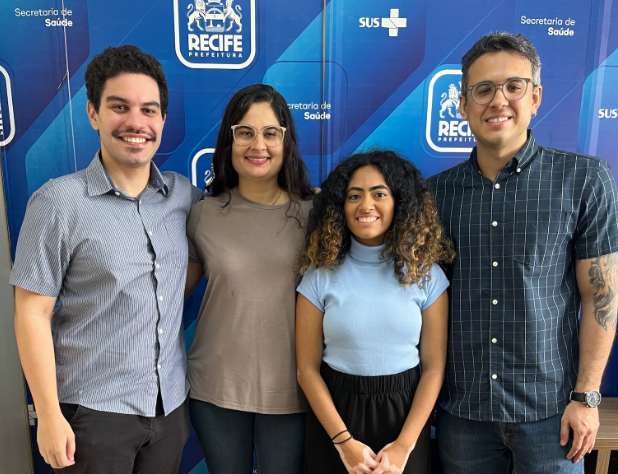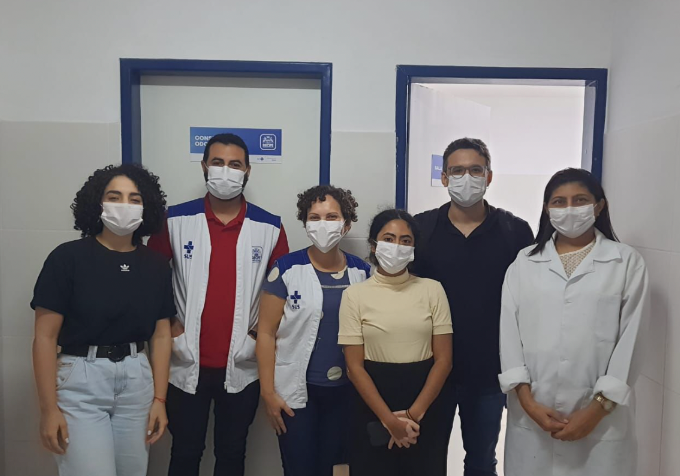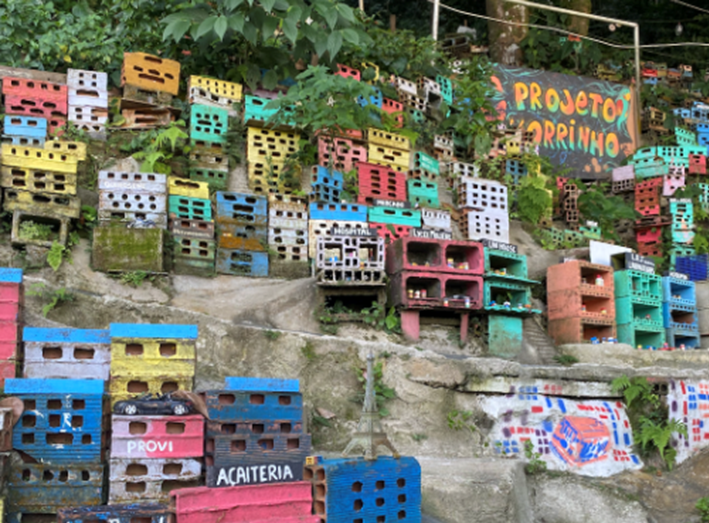Pictured above: Project Morrinho – a social and cultural project based out of the Favelas is a 450m² model of the city constructed from bricks and other recycled materials
By Medha Iyer
Rose Service Learning Fellow
SM Candidate, Department of Global Health and Populations
“Bom dia! Tudo bem?” This, followed by a warm hug and a smile, was the customary introduction from nearly everyone I encountered in Brazil. My voyage into Brazil was prompted by a course (GHP 550) taught by Professor Miguel Lago. The course delved into themes of social participation, quality healthcare, and patient engagement, topics close to my heart. My fascination with universal healthcare and its ability to provide essential medical services to a broad population for free drew me to Brazil, a nation renowned for championing this cause. Instituto de Estudos para Políticas de Saúde (IEPS) is a non-profit organization that aims to expand health equity grounded in expanding access to quality healthcare with effective utilization of resources for the most marginalized communities.

Primary health care is delivered through family health units, which serve as clinics in Brazil and are the core of the National System run by the municipalities with one of the strongest decentralized healthcare systems. The IEPS community seeks to understand gaps in access and utilization of primary and maternal health care services in the region, from an administrative and individual level. There was one overarching goal for this project regarding primary health care service delivery in Brazil: to determine the current state of social participation, patient engagement, and utilization of health services, considering the recent shift in national leadership.
This summer, I collaborated closely with the IEPS team working on Recife Monitora as part of the larger Projeto “Qualifica Atenção Básica” partnership with Recife. The first axis of Recife Monitora is to evaluate the relationships between health providers, provider work processes, and the family health unit structure. The second axis of Recife Monitora is determining patient satisfaction via feedback of healthcare services disseminated through Whatsapp or QR codes in the family health units. The third axis is to monitor team performance based on indicators developed by the health ministry and indicators currently monitored by the City of Recife. I met with stakeholders (on the health councils, providers in health units, educators, and local activists) in Rio de Janeiro and Recife to determine the role of social participation in health care delivery patterns within the state of Brazil, and drafted recommendations to improve quality of care as identified by community members.
Overall, we determined that there were significant gaps in communication and understanding of Recife Monitora. When I spoke with community health workers at health units, they had a very different understanding of the program compared to policymakers at the City Hall. There was a mismatch between the intended purpose of the program and the actual implementation on the ground. Several patients and health workers did not know that there were QR codes in some health units to provide feedback about their care. The populations being served did not often have access to phones or technology to scan the QR codes. Family health units differed a lot administratively based on whether or not they had a manager. Some units did not know how to use the digital platform for Recife Monitora or had not received the training. A major concern from health workers was time to be able to complete the internal team evaluations. I developed recommendations based on common themes that emerged during interviews. These included 1) communication between policy stakeholders, Recife City Hall, IEPS, territory supporters, and family health units, 2) consistent education and training with visual aids about how to use the digital platform, 3) technology access and utilization, and 4) streamlining connection between other Recife projects. The results of the first phase were presented to the Secretary of Primary Health Care in Recife in mid-August.

When I visited the family health units, I was intrigued by the collective passion for quality health delivery. Humans are not seen as “consumers” as they are in the United States. The clinic managers taught me a lot about service delivery and the ways that they stock their medications (free for anyone who needs them). I think we have a lot to learn from the Brazilian healthcare system and other countries at the forefront of ensuring universal healthcare access to their citizens.
I am currently developing a report for IEPS and the health units that summarizes findings about patient engagement. My work at IEPS will directly relate to my thesis work since I am interested in looking at how patient involvement can be strengthened by obtaining input from policymakers as well as patients themselves.
For fellow researchers embarking on international projects, my advice is to place the community at the heart of your work, listening and learning from their experiences. I spent a lot of time engaging local transcribers and translators to ensure accurate documentation in their preferred language. I identified a method of ethical compensation, aligned with local standards, and decided to compensate my team as they would be compensated in the United States. Acknowledging the distinctions between nonprofit and private sector work, and considering financial constraints and resource requirements became vital when determining questions to ask at the health units and City Hall. Finally, immerse yourself in the culture, make friends, and cherish the profound connections that can arise from research endeavors abroad.

You must be logged in to post a comment.